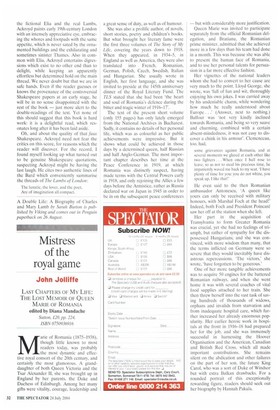Mistress of the royal game
John Joiliffe
LAST CHAPTERS OF MY LIFE: THE LOST MEMOIR OF QUEEN MARIE OF ROMANIA edited by Diana Mandache Sutton, £20, pp. 224, ISBN 0750936916 marie of Romania (1875-1938), though little known to most readers today, was probably the most dynamic and effective royal consort of the 20th century, and certainly the most glamorous. A granddaughter of both Queen Victoria and the Tsar Alexander II, she was brought up in England by her parents, the Duke and Duchess of Edinburgh. Among her many gifts were vitality, courage, leadership and
a great sense of duty, as well as of humour.
She was also a prolific author, of novels, short stories, poetry and children's books. But what brought her literary fame were the first three volumes of The Story of My Life, covering the years down to 1918. When they appeared. in 1934-5, in England as well as America, they were also translated into French, Romanian, German, Polish, Czech, Swedish, Italian and Hungarian. She usually wrote in English, her first language, and she was invited to preside at the 145th anniversary dinner of the Royal Literary Fund. The TLS stated that she had been 'the heart and soul of Romania's defence during the bitter and tragic winter of 1916-17'.
The text of the present short volume (only 155 pages) has only lately emerged from the National Archives in Bucharest. Sadly, it contains no details of her personal life, which was as colourful as her public achievements were impressive. But it shows what could be achieved in those days by a determined queen, half Russian and half Anglo-German. The most important chapter describes her time at the Peace Conference in 1919, at which Romania was distinctly suspect, having made terms with the Central Powers early in 1918, and only rejoining the Allies a few days before the Armistice, rather as Russia declared war on Japan in 1945 in order to be in on the subsequent peace conferences — but with considerably more justification.
Queen Marie was invited to participate separately from the official Romanian delegation, and Bratianu, the Romanian prime minister, admitted that she achieved more in a few days than his team had done in a month. This was because she was able to present the human face of Romania, and to use her personal talents for persuasion in a far more effective fashion.
Her vignettes of the national leaders whom she had to convert to her cause are very much to the point. Lloyd George, she wrote, was 'full of fun and wit, thoroughly enjoying his own jokes. I was carried away by his undeniable charm, while wondering how much he really understood about Europe . .' (Answer, next to nothing.) Balfour was 'not very kindly inclined towards Romania, and being so very suave and charming, combined with a certain absent-mindedness, it was not easy to discover a chink in his armour'. Clemenceau, too, had,
some grievances against Romania, and at several moments we glared at each other like two fighters .. . When once I half rose to leave, so as not to steal his precious time, he impatiently waved me back to my scat. 'I have plenty of time for you: you do not whine, you speak up, I like that!'
He even said to the then Romanian ambassador Antonescu, 'A queen like yours can only be received with military honours, with Marshal Foch at the head!' Indeed, both Foch and President Poincare saw her off at the station when she left.
Her part in the acquisition of Transylvania to form Greater Romania was crucial, yet she had no feelings of triumph, but rather of sympathy for the dispossessed Hungarians; and she was convinced, with more wisdom than many, that the terms inflicted on Germany were so severe that they would inevitably have disastrous repercussions. 'The victors,' she wrote, 'have forgotten to be generous.'
One of her more tangible achievements was to acquire 50 engines for the battered Romanian railways, and when she went home it was with several coaches of vital food supplies attached to her train. She then threw herself into the vast task of saving hundreds of thousands of widows, orphans and invalids from starvation and from inadequate hospital care, which further increased her already enormous popularity. Her earlier heroic work in hospitals at the front in 1916-18 had prepared her for the job, and she was immensely successful in harnessing the Hoover Organisation and the American, Canadian and British Red Cross, which all made important contributions. She remains silent on the abdication and other failures on the part of her son, the future King Carol, who was a sort of Duke of Windsor but with extra Balkan drawbacks. For a rounded portrait of this exceptionally rewarding figure, readers should seek out her biography by Hannah Pakula,


























































 Previous page
Previous page